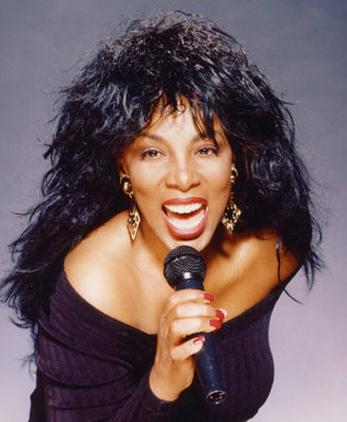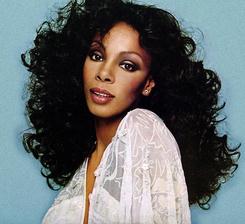May 17 UPDATE: TMZ is reporting that Donna Summer died of cancer this morning in Florida at age 63.
In the article below from 2008, Xtra writer Richard Burnett chatted with Donna Summer.
Donna Summer remembers the day she discovered “Love to Love You Baby” was number two on the Billboard Hot 100 Chart. She was returning to America from Germany in 1975 and was being picked up at the airport by the late Neil Bogart, the Svengali behind Casablanca Records.
“I was elated!” Summer said. “I got off the plane and stepped into the limousine. Neil closed the door and we heard the first beats of “Love to Love You Baby” come on the radio.”
Then Summer began to sing “Love to Love You Baby” to me over the phone. I just about died and went to disco heaven.
“The driver had no idea that song was mine,” Summer laughed. “The song became a smash!”
So big, in fact, that Summer singlehandedly brought disco out of the gay and black underground nightclubs into the mainstream, becoming the ultimate disco diva of the era.
“People continue to love disco because it’s joyful music,” Summer explained.
But Summer was always more than just disco.
The Boston-born beauty learnt her vocal chops singing gospel music in church, then auditioned – along with 300 other aspiring singers – for a part in the musical Hair in NYC. She won a role in the German production, moved to Munich and became a huge star in Europe.
Then she met producer Giorgio Moroder, the man who recorded “Love to Love You Baby” (with lyrics by Summer); 1977′s monumental “I Feel Love,” the gay anthem that laid the groundwork for the techno revolution of the ’80s and ’90s; and 1979′s number one disco duet “No More Tears (Enough Is Enough)” with Barbra Streisand.
The rest, as they say, is history, and Summer went on to sell more than 130 million records.
Summer left Casablanca for Geffen Records – going from the hands of one Svengali (the late Neil Bogart) into another’s (David Geffen would pair Summer with producer Quincy Jones) – after she won the first-ever Grammy Award for Best Female Rock Vocal for “Hot Stuff” in 1980.
“Awards are not important in and of themselves,” Summer told me, then joked, “though I do pick up a bottle of water sometimes thinking of getting a 10th Grammy.”
Then came the homophobic “disco sucks” backlash. Disco, mainstream America made very clear, is cocksucker music.
“The real animosity between rock and disco lay in the position of the straight white male,” music critic Peter Braunstein opined in the Village Voice. “In the rock world, he was the undisputed top, while in disco, he was subject to a radical decentring. Only by killing disco could rock affirm its threatened masculinity.”
Along the way the disco backlash claimed many careers.
For Summer, the attack was double-barrelled. In the early 1980s, an urban myth claimed Summer made anti-gay remarks, that AIDS was divine retribution from God, and many gay clubs banned her music.
Summer issued a press statement in 1984 denying any homophobic statements. But in 1991 New York magazine printed a two-paragraph item in its gossip column rehashing the rumours, concluding, “It’s incomprehensible that she won’t retract those statements.”
Summer sued the magazine for libel for $50 million and settled out of court.
“It was awful, especially since none of it was true,” Summer told me. “But I can’t hunt these people down. In this business people write stuff about you all the time, and I can’t control everything.”
But what is it about Donna Summer that gay men love? Is it the big voice? The big personality? The big hair?
“People ask me this all the time, and I tell them it’s not about how I look,” Summer replied, “It’s that I love you back. It’s about love. I have an ability to bring gay and straight people together [at my concerts], and [it’s] all about the love.”
In 2008, 17 years after the New York battle of 1991, the same year she recorded her last album of original music, Summer released Crayons (Burgundy Records/Sony BMG), her critically hailed album of original material that featured the number one Billboard dance hit “Stamp Your Feet” and the aptly named track “The Queen Is Back,” in which Summer name-checks her old hits “On the Radio” and “Love to Love You Baby.”
“I’m poking fun at myself,” Summer said. “The title is tongue in cheek!”
But Donna Summer admitted she could be something of a diva.
“I think I’m a diva in the theatrical sense,” the Queen replied. “But not in my personal life. There is a big separation between who I am and what I do, and I do it well.”



 Why you can trust Xtra
Why you can trust Xtra


